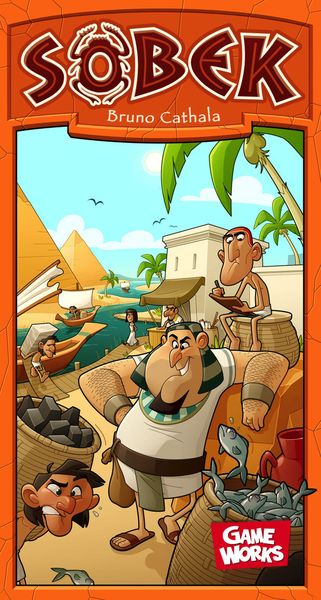Sobek (2010) Board Game
Sobek is a board game released in 2010 that takes players back to ancient Egypt. Designed by Mathieu Beaulieu and beautifully illustrated by GameWorks SàRL, Sobek is a card game that combines elements of auction, hand management, memory, open drafting, and set collection. Players take on the roles of ancient Egyptian merchants competing to build the most valuable collection of artifacts dedicated to the crocodile god, Sobek.
Game Components of Sobek
How To Setup Sobek
To set up Sobek, begin by preparing the game board. In the multi-player version, shuffle the beige resource cards and the orange character cards, then line up 9 of them along the river on the scoreboard, with resources face up and characters face down. Shuffle the 12 event tokens and draw 5, placing them face down. Each player receives two starting cards with green backs. In the 2-player version, arrange the goods tiles on the market board in a specific spiral pattern, ensuring each tile is correctly oriented according to its directional markings.
Gameplay Mechanics and Game Objective
Player Experience
Sobek offers a dynamic and interactive experience, particularly in its 2-player version. The game is marked by the strategic use of the Ankh token, which dictates tile collection and introduces a chess-like quality to the gameplay. Players must balance the temptation to skip tiles for better rewards against the risk of accumulating corruption. Character tiles add an element of unpredictability, while the scarab tokens provide a clear path to scoring.
Pros
Cons
Personal Thoughts on Sobek
Sobek is ideal for players who enjoy interactive games with strategic depth and a touch of unpredictability. It is particularly suited for those who appreciate set collection and resource management mechanics. For two players, Sobek offers a compelling and tense experience, with the Ankh token adding a unique twist to the gameplay. However, it may not be the best fit for players seeking a completely cooperative or light-hearted experience, as it involves strategic competition and potential negative interactions.
We are supported by our audience. When you purchase through links on our site, we may earn an affiliate commission, at no extra cost for you. Learn more.

